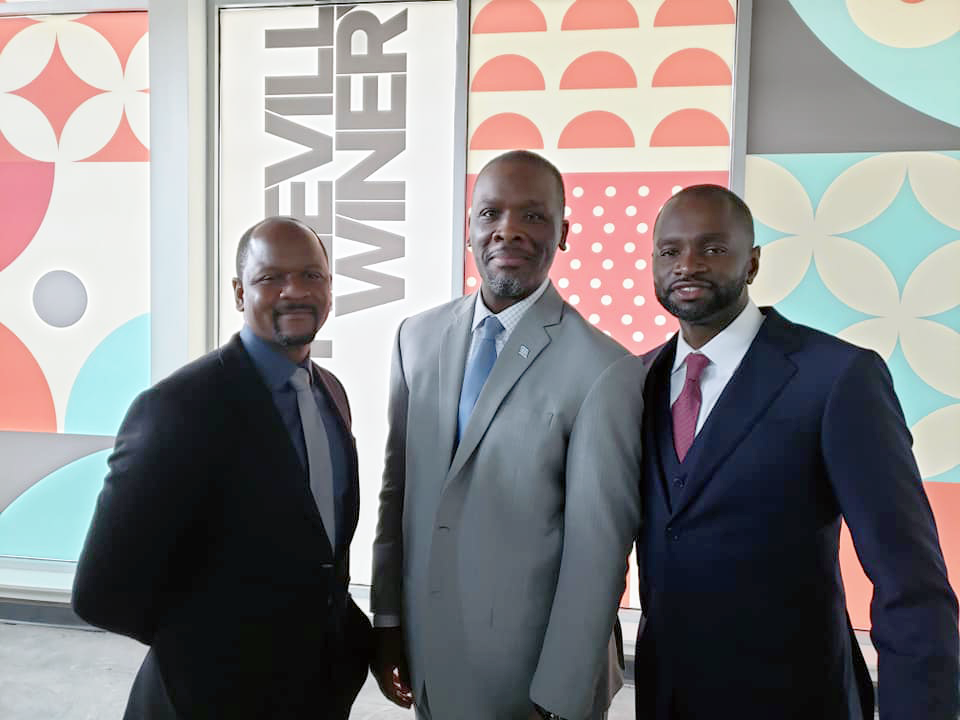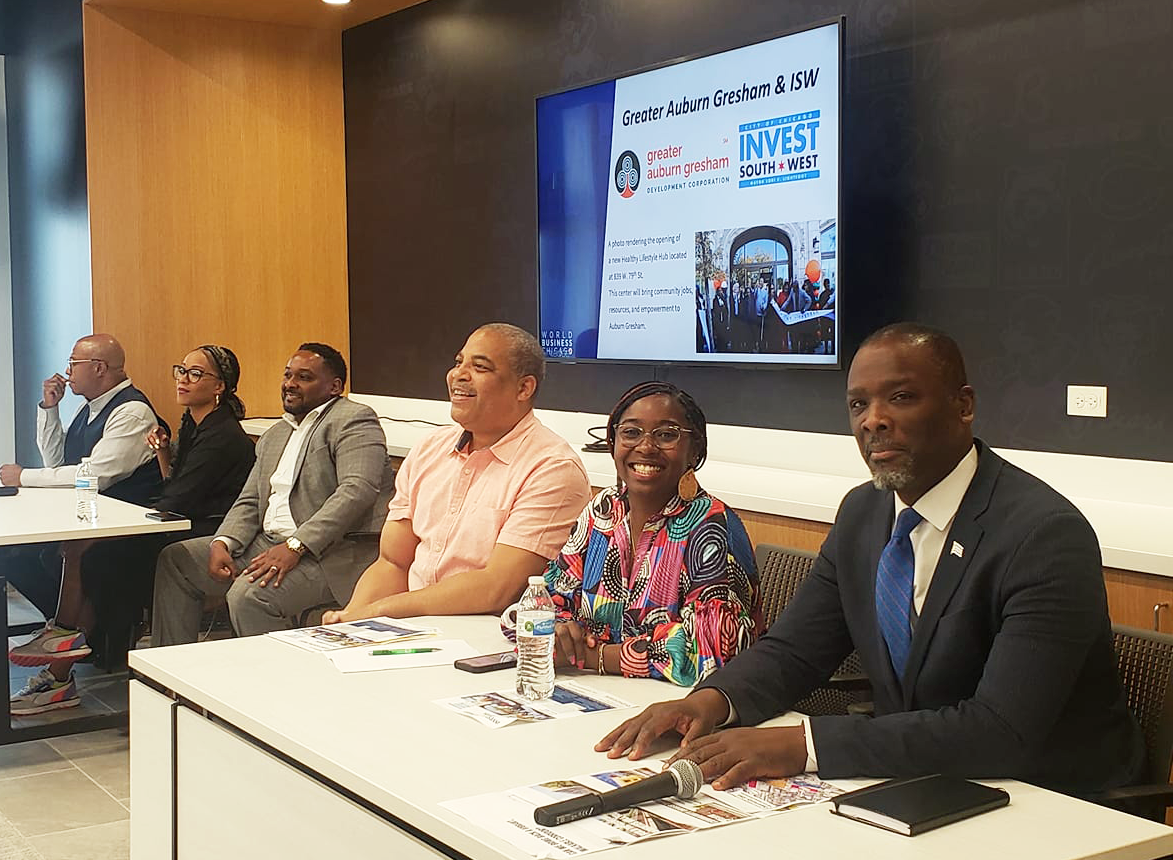Meet Patrick Brutus: The Desk’s new Senior Director for Real Estate Programs
April 23, 2024 In April 2024, Patrick Brutus joined Community Desk Chicago as our new Senior Director, Real Estate Programs, bringing more than 25 years of public sector experience in economic and community development. He got his start in public service at the Illinois Department of Transportation before making the transition to the City of Chicago in 2006, and then spent nearly two decades with the City of Chicago’s Department of Planning and Development, where he led community development efforts on Chicago’s West Side.
In April 2024, Patrick Brutus joined Community Desk Chicago as our new Senior Director, Real Estate Programs, bringing more than 25 years of public sector experience in economic and community development. He got his start in public service at the Illinois Department of Transportation before making the transition to the City of Chicago in 2006, and then spent nearly two decades with the City of Chicago’s Department of Planning and Development, where he led community development efforts on Chicago’s West Side.
Patrick then transitioned his work citywide, coordinating with developers to reactivate troubled properties across Chicago in the Neighborhood Stabilization Program. Under Mayor Emmanuel, Patrick focused on two small business programs that stimulate the local economy: the Special Service Area program that serves to increase business improvement in Chicago’s commercial corridors, and the TIFWorks Program that funds workforce-training costs for companies located in tax increment financing (TIF) districts.
Most recently, during Mayor Lightfoot’s administration, Patrick played a critical role as a Planner in the heralded Invest South/West Program and successfully managed the first three Invest South/West retail corridor projects to advance to the construction phase in Auburn Gresham and Englewood.
Here’s what Patrick had to say about his new work with Community Desk Chicago, where he will serve as Senior Director of Real Estate Programs, leading the organization’s efforts to re-invigorate and create reliable jobs in Chicago’s business corridors.
What specifically draws you to the mission of Community Desk Chicago?
What’s most exciting is the idea of working with local partners to really beef up our corridors and support small businesses that are generated by the local folks who live in those communities. That’s how you build a city from the inside out. It can be easy to focus only on corporate recruitment, but these neighborhoods need the same kind of opportunity to have an impact and grow economically as well.
This is the work that needs to be done at multiple levels, especially in a city like Chicago where we have such a divide between downtown and our neighborhoods. People talk about population, talk about crime and safety, but people really desire a place to live, work, and play. People want those neighborhood amenities like a local coffee shop or retail store, and they want to be able to access these amenities in their neighborhood.
Coming to Community Desk Chicago serves as an opportunity for me to re-solidify the relationships that I made during my time at the City and continue spearheading development efforts in our neighborhoods.
 What would you tell someone if they were to ask why it’s important to be investing in our neighborhoods and our neighborhood business corridors?
What would you tell someone if they were to ask why it’s important to be investing in our neighborhoods and our neighborhood business corridors?
There are several reasons why we need to be investing in our neighborhood business corridors.
One, we need to activate vacant or underutilized property across Chicago. We don’t want to continue having eyesores in our neighborhoods like you’re seeing all over the country. These are areas where there are under-capitalized, under-resourced, under-invested, under-utilized, or vacant buildings and property. Those eyesores slowly kill a neighborhood because as people walk by those properties every day, they start to lose hope in their community.
Secondly, we need to find how to reinvest in our people, and the ideas they have for generating hope and excitement in their communities. Chicago is a city full of neighborhoods, and that’s what makes us unique. We need to find ways to accentuate the positives of each place and build on the unique strengths there. I think all those things make our neighborhoods attractive, and we have a lot of opportunities in communities like South Shore, Englewood, Humboldt Park, Avalon Park, and South Chicago to do exactly those things with input from community members.
How can the local government better support development in our communities?
The City has done an admirable job of supporting local development, but I would love to see them do more.
One thing they can do is change the way they disburse grant money to support small businesses. In a lot of cases, City grants are “reimbursable” — meaning the small business owners have to spend the money first, and then get reimbursed by the City later — which puts a strain on small business owners. After all, it’s extremely challenging to get up-front capital, which is why they need the grant in the first place.
I’d also like to see the City be more holistic in offering support services to small business owners. We need to be letting small business owners know about all of the tax services, training programs, and subsidies that are available to them.

How do you see the City of Chicago’s economy, specifically on the South and West Sides, evolving in the next 5 to 10 years?
I would love to see safety, education, and all those things that make a neighborhood attractive improve in the neighborhoods where Community Desk Chicago’s work is currently being executed. I believe very strongly that our mission matters, and I’m optimistic that we will see more folks moving to neighborhoods like Englewood and South Shore as a result of our work on those corridors.
What’s your favorite way to spend a pleasant afternoon in Chicago?
I enjoy playing golf at either South Shore or Sydney Marovitz on the north side. If I can’t do that, I do try to get out with the family and visit neighborhoods that offer dining that we don’t get to see in my community because we like to try new restaurants. This way we get out and experience a lot of what this makes Chicago unique and special.